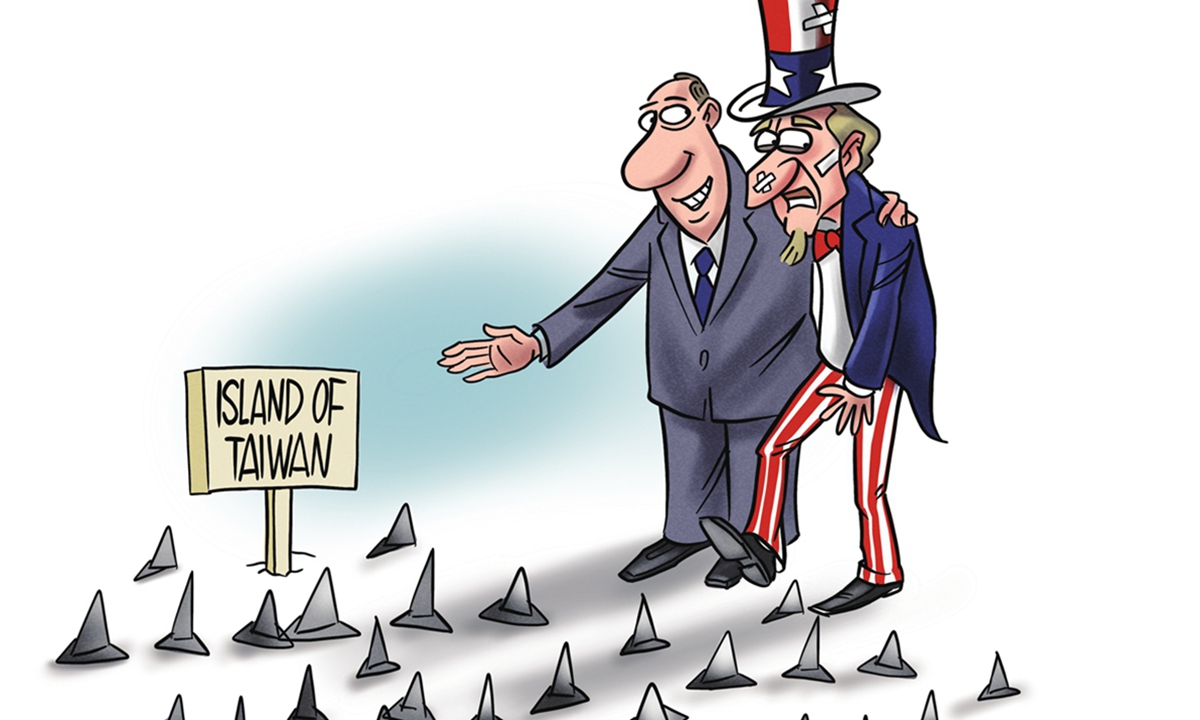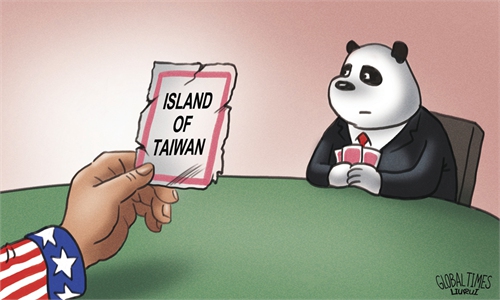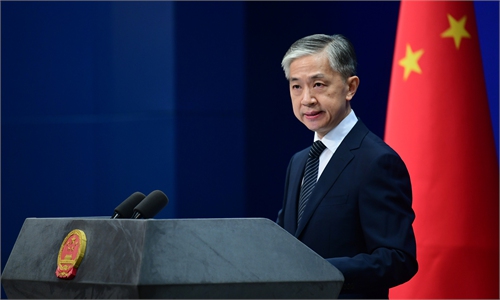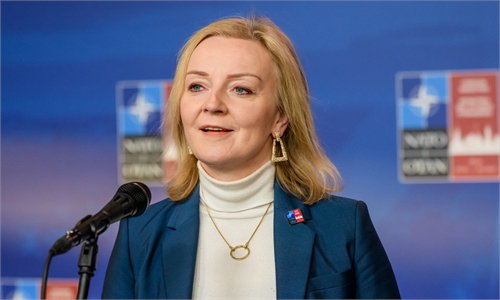
Illustration: Chen Xia/GT
During his Shangri-La Dialogue meeting with China's Defense Minister Wei Fenghe, US Secretary of Defense (SECDEF) Lloyd Austin characterized China's internal Taiwan policies and activities as provocative and destabilizing. He did so with full knowledge that a nuclear-armed China is poised to employ any necessary means to prevent the island from seceding from One China.General Austin's comments suggest that the US believes it has some globally recognized authority to judge and militarily interfere with the sovereign affairs of others. Normally, this would indicate that the SECDEF had been poorly briefed by his staff. But Gen Austin was well-prepared, so explanations other than ignorance of the verifiable facts must be considered.
It is possible that the military culture in which Gen Austin was molded might have influenced his odd position. Having served honorably as a soldier for 41 years, obedience to the orders of superiors is ingrained in his thinking. President Biden's expressed intent to militarily meddle in China's affairs was sufficient for Gen Austin to overlook realty, salute, and provoke China into a fight.
A comparable situation occurred while retired US Army General Collin Powell served as US Secretary of State. President George Bush's intent was to achieve regime change in Iraq. But a plausible pretext for invasion was lacking, yet critical for United Nations (UN) buy-in.
The US intelligence community promoted weak pretexts related to weapons of mass destruction and sponsorship of terrorism, so the President turned to Gen Powell to add credibility. The UN subsequently approved the multi-national debacle, one that later unraveled into another American tragedy. Gen Powell's loyalty may have suppressed his instinct to pushback against the Whitehouse.
Like Gen Powell, Gen Austin is a retired Army four-star general. Given the President's stated intent to military come to Taiwan island's defense, Gen Austin's logic-defying concerns over PRC-Taiwan island policy could have a similar cause.
However, unlike Gen Powell, following his military retirement Gen Austin elected to receive a generous salary as a member of the board of directors of arms merchant, Raytheon. Gen Austin's SECDEF predecessor, General James N. Mattis USMC (Ret.) similarly accepted a generous salary as a General Dynamics (GD) board member after he retired.
Considering the profit-incentivized nature of the defense industry one might conclude that the objectivity of four-star Generals-turned industry executives compromises their decision-making if appointed as SECDEFs.
Many Americans would disagree, insisting that the character of any Flag officer, especially one with four-stars, is incorruptible by any industry interests, and his or her decisions should be assumed to be above reproach. They would point to Generals George Marshall, Dwight Eisenhower, and Collin Powell as untainted by their choices in post-military private life.
However, those historical figures did not elect to draw salaries from high-paying arms merchants. Luckily for Generals Austin and Mattis, a modern US spoils system permits the President's ethics program to approve waivers with negligible Congressional oversight.
At his SECDEF nomination hearings Gen Austin also stated: "I do not intend to seek employment as a lobbyist or sit on the board of a defense contractor, like Raytheon after my service." But the precedent contradicts those assurances. Specifically, during his confirmation process Gen Mattis agreed to cut ties with GD if confirmed as SECDEF. Yet, upon his resignation he was promptly rehired to serve on the GD board of directors.
A neutral observer would conclude that neither SECDEF is above reproach. In fact, their expressions of disdain for the PRC, and fawning admiration for Taiwan island's secessionists could be interpreted as opportunistic warmongering.
This is evidence of a dangerous hypocrisy, and lays bare the selfish industry interest-favoring biases that trump the national interest, both in and outside of government. Worse yet, this occurs at the level of the President's most trusted civilian advisors on military matters.
If Americans knew what motivations prompt US senior leaders to repeatedly engage in losing foreign adventures - like defending Taiwan - they might be more cautious before entrusting the military with the lives of their idealistic sons and daughters.
The author is a retired Marine Corps infantry officer and a former Pentagon employee. Opinions are of the author and do not represent the US government. opinion@globaltimes.com.cn



